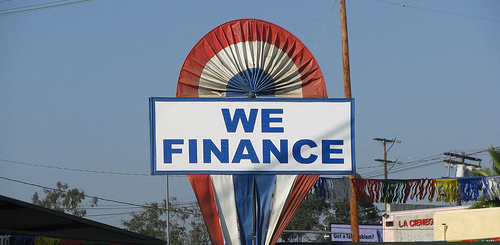
Ever wonder how credit card companies make their money? If you’re like me, you probably have, and if you weren’t sure, they make the bulk of their money from finance charges.
Put simply, “credit card finance charges” are fees tacked onto your outstanding credit card balance if it isn’t paid off in full within the grace period, or by the due date following the billing cycle in which the charges were made.
Finance Charges = Credit Card Interest
In reality, it’s just a fancy way of saying interest, which is the cost of the money you borrow from the credit card issuer, determined by the associated interest rate, or annual percentage rate (APR).
Finance charges will range tremendously depending on your credit card balance and the APR (interest rate) tied to your credit card.
[highlight color=”yellow”]Basically the higher your APR/balance, the higher the finance charges. And vice versa.[/highlight]
While finance charges may not seem like much if you’ve got a small balance of say a few hundred dollars, they can certainly add up over time.
In fact, credit card companies bank on these “small fees” making them a fortune over time because they often go unnoticed by cardholders.
And if you only make the minimum payment each month, chances are you won’t be doing much more than paying interest on your credit card debt, while leaving much of the principal balance untouched. In other words, never-ending debt.
Remember, the less you pay each month on an existing credit card balance, the longer it will take to pay down. And the longer it takes, the more you will pay in interest year after year. Period.
[Does carrying a balance help your credit score?]
Credit Card Issuers Calculate Finance Charges Differently
The best way to avoid paying finance charges is to pay your balance in full each month, every month. If you do, you’ll never pay any finance charges. However, if you carry a balance month to month, you’ll owe interest until you pay everything off in full.
If you can’t do that, be sure to contact your bank and ask them exactly how they calculate finance charges, and when they apply them to your balance. Banks use different methods, so it’s imperative to speak directly with your credit card company to get the correct information.
Some banks use the average daily balance method whereby they take your daily balance, divide it by the days in the month, and then multiply it by the credit card APR divided by 12 (months).
For example, if your APR is 20% and your average daily balance is $500, your finance charges would total $8.33 a month, or nearly $100 a year. And that’s before factoring in compounding interest.
Another method for assessing finance charges is the two-cycle billing period, which takes the sum of the last two months to determine applicable finance charges. But most banks using this method leave out new purchases, so the finance charges are similar to the average daily balance system.
[Should you pay your credit card off in full?]
Avoid Finance Charges with Balance Transfers
That being said, the best practice aside from understanding how your bank assesses finance charges is to avoid paying them. If you’re unable to pay off a large balance set at a sky-high APR, consider a credit card balance transfer to a 0% APR credit card instead.
Doing so can help you avoid finance charges for 12 months or longer. And every payment you make while the APR is set at 0% will go toward the actual debt, not toward interest. It’s essentially a finance charge-free period and a very efficient way to pay off credit card debt.
A 0% APR balance transfer may even allow you to pay off all your credit card debt without incurring any finance charges or associated fees if completed during the promotional period. Also consider balance transfer checks if the terms are favorable.
Finally, never make just the minimum payment on your credit card(s) unless you have to. This will result in the largest amount of finance charges and a lifetime of debt.
Read more: How to calculate credit card interest.
- Make Sure You Have a Premium Chase Credit Card so You Can Transfer Points! - February 21, 2025
- Do Capital One Credit Cards Have a 5/24 Rule Too? - February 23, 2023
- Quickly See the Many Ways You Can Use American Express Membership Rewards Points - February 21, 2023

Why on earth would anyone ever pay finance charges with all the 0% APR offers readily available?
Alyssa,
That’s if they can get approved for such offers…not everyone can take advantage depending on their credit history.
I got approved for a 0% APR balance transfer finally! Now I don’t have to deal with interest charges! Yey!